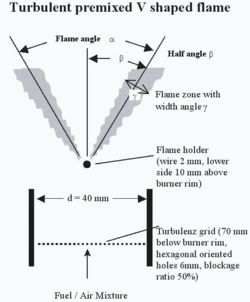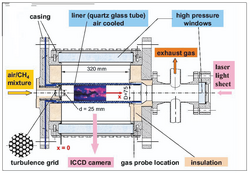Implementation and Validation of LES Turbulent Models for the Partially Premixed Combustion
by L. Durand and Wolfgang Polifke
Motivation
With the demand of designing lower pollutant gas turbines, the present and future trends in chamber design focus on lean premixed burners. As the technical applications impose turbulent flows, efficient tools for modeling the lean premixed turbulent flames have to be developed, or rather tools for partially premixed turbulent flames. Indeed, the small residence time in the gas turbine combustor prevents the lean mixture from being perfectly premixed. As a consequence the models should be able to take into considerations the different scales of the problem (turbulent scales, flame scale and mixing scale) to give relevant results. The problem is that only DNS calculations can calculate all the range of scales, and the actual computers are not powerful enough to treat the complex industrial problems with this type of modelisation. On the other side, the (U)RANS methods have reached their final development, and are intrinsically not fine enough to treat the interactions between the scales. That is why the LES modeling currently offers the best alternative.
Objectives and Strategy
This project aims at implementing and validating some LES combustion models in a commercial solver and to compare these results to experimental data, and also LES and DNS results of a research solver called NSF. This latter solver has been developed by the chair for Fluids Mechanics directed by Prof. Friedrich at the Technical University of Munich. It was designed to solve turbulent compressible subsonic or hypersonic flows in structured grids with high order schemes. Five transport equations are solved for the following variables: the pressure p, the components for the velocity u, v and w and the entropy s. These equations are written in a wave formulation using Riemann´s invariants and based on a fifth order upwind scheme for the space derivation, and on a five-step Runge-Kutta scheme for the time advancement. The implementation of the same LES model in two different solvers should give the possibility to quantify the influence of the model itself on the quality of the solution. The implementation of a new model specifically developped for the LES context is also planned.
Validation Cases
Since the DNS solver can only calculate simple geometries with structured and Cartesian grids, the first validation case retained is a turbulent premixed V-flame burner with a relative small turbulent Reynolds number (Ret=80). This burner was investigated by Dinkelacker & al. at the LTT in Erlangen. The flame angle ß was measured as a function of the mass flow rate and of the stoichiometric ratio.

Another burner experimented at the Paul Sherrer Institute is also simulated but only with the commercial solver Fluent, since the highly turbulent (Ret=500) premixed flame can not be simulated with the solver NSF.

Combustion Model
For the LES simulations, models with a progress variable have been implemented. First, the TF-LES model (Thickened Flame) by Veynante & Poinsot is implemented. This model is based on an artificial thickening of the flame, so that the flame can be directly resolved. The source term is estimated with an Arrhenius formulation. The problem of this model is due to the modification of the interaction between the flame and the flow by the change of the flame thickness. An efficiency function is needed to compensate this.
Secondly, a TFC model (Turbulent Flame speed Closure) with the closure term by Zimont is implemented. This model was developed for the RANS equations. It is based on a transport equation for the progress variable, which the source term being proportional to a turbulent flame speed. The results strongly depend on the evaluation of this turbulent flame speed. This model has been adapted for the LES by Flohr & Pitsch. This last formulation has the drawback to be explicitly grid-dependant. A transport equation for the fuel air ratio is added here to treat the partially premixed combustion.
Results



